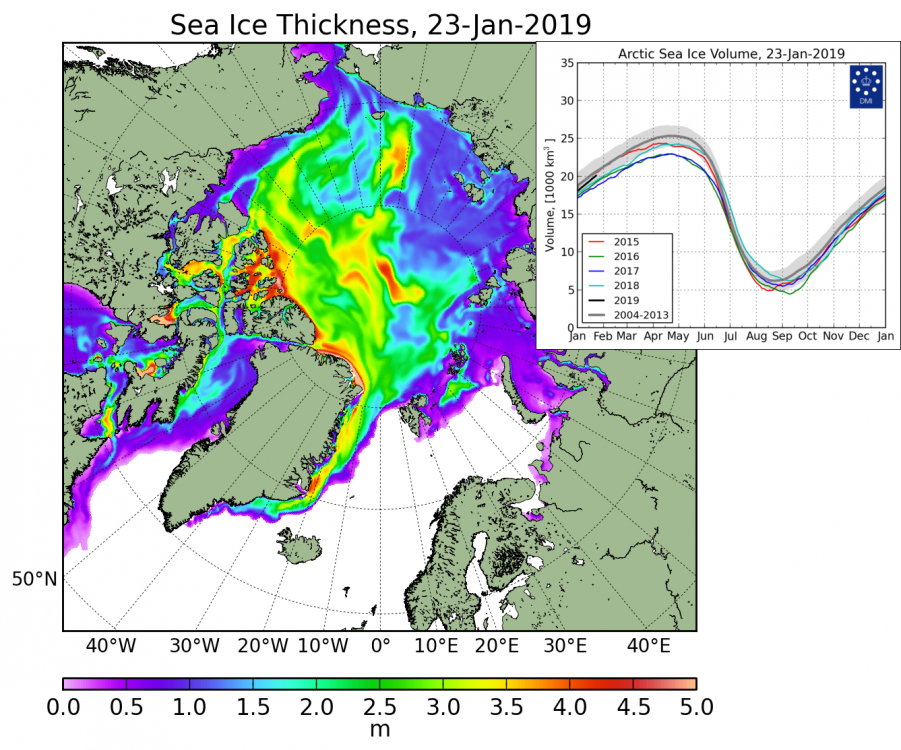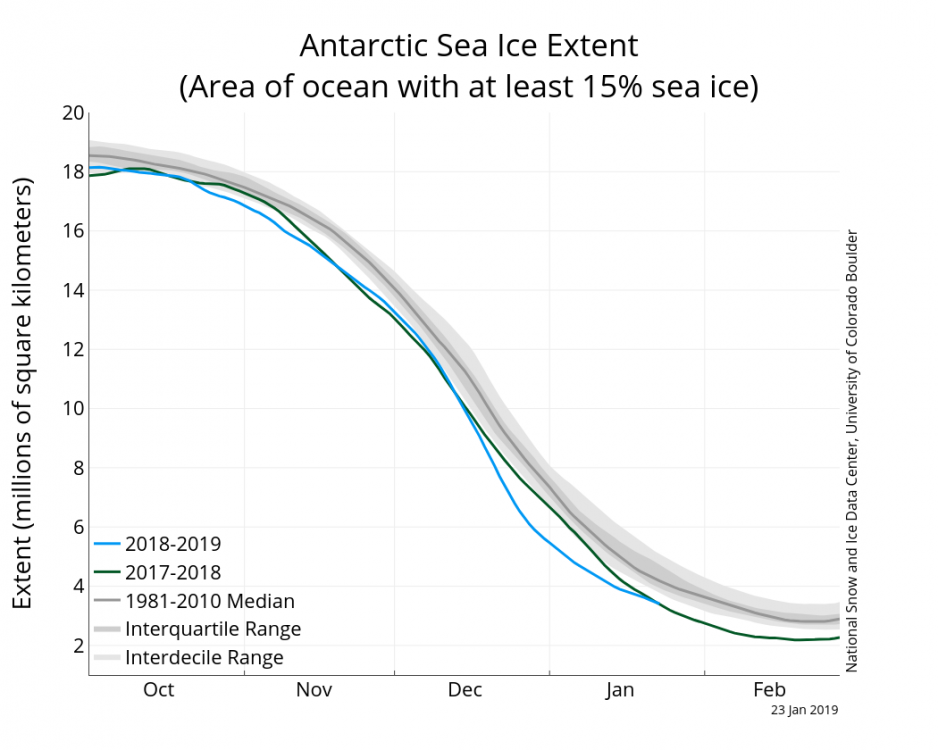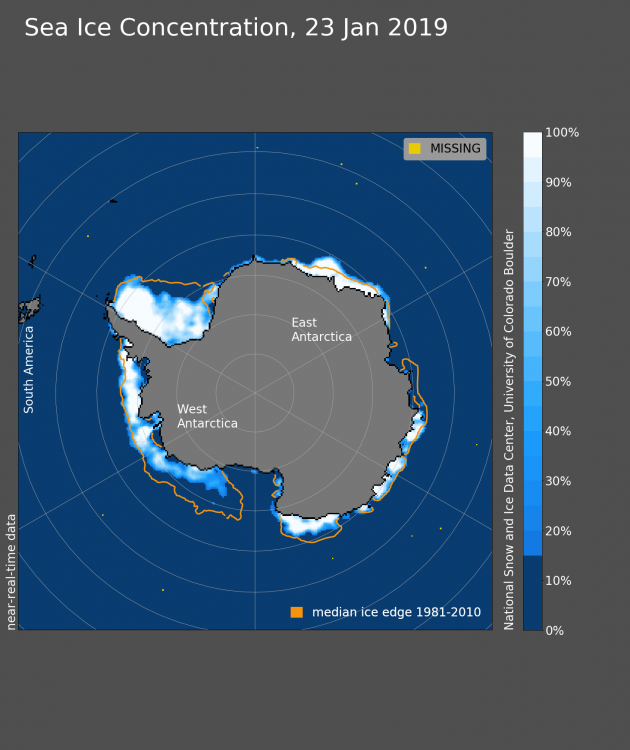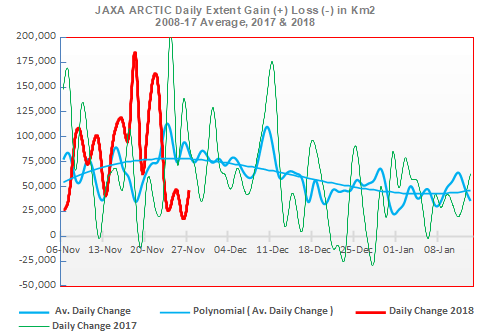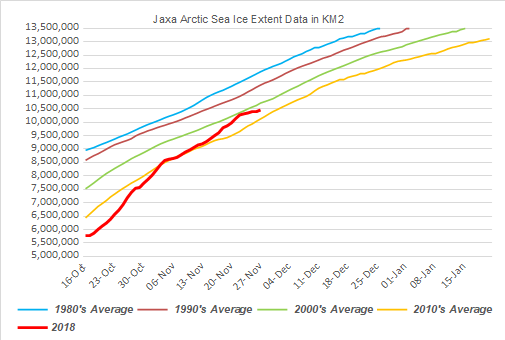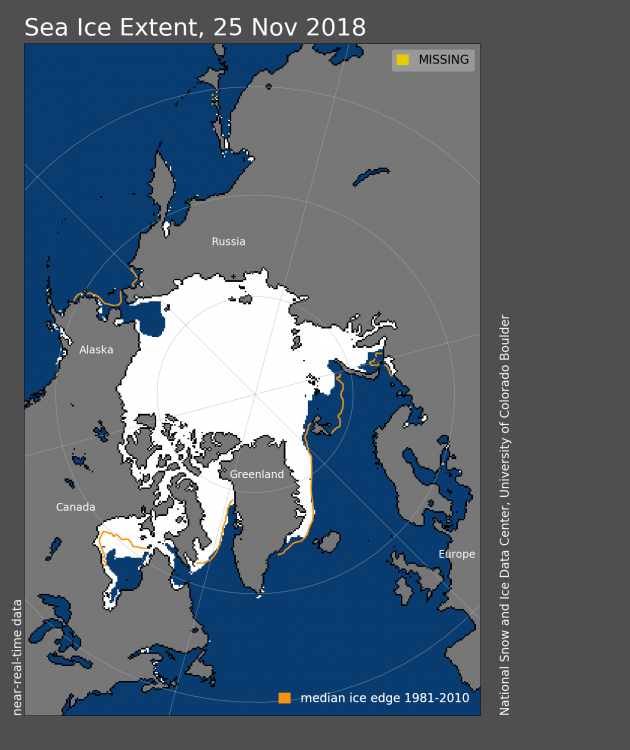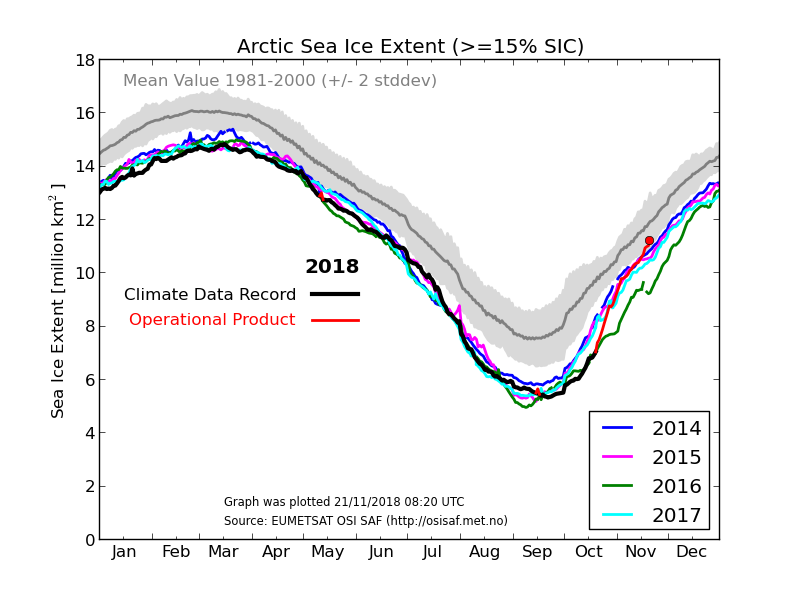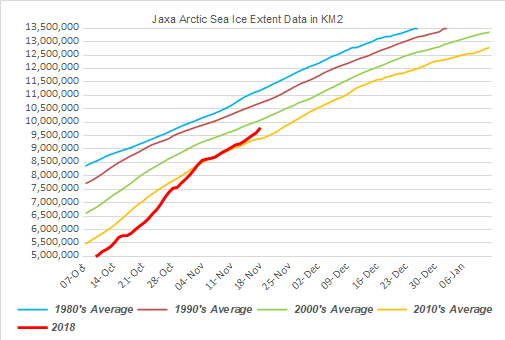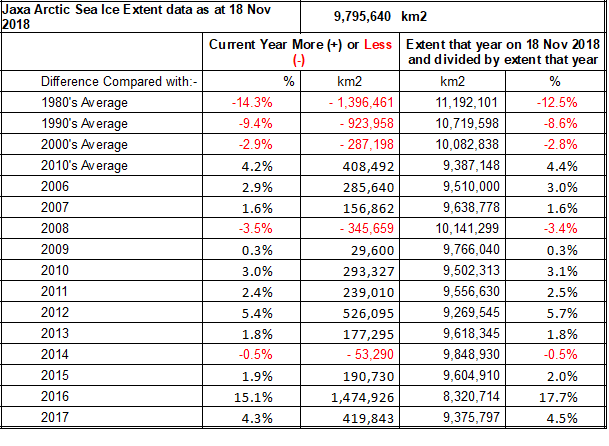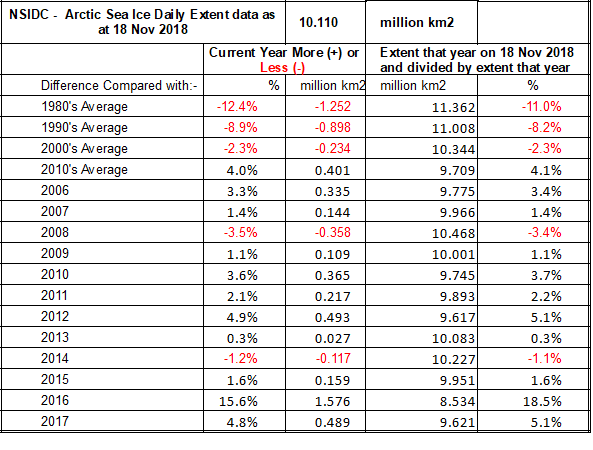
snowlover91
Members-
Posts
1,277 -
Joined
-
Last visited
About snowlover91

Recent Profile Visitors
The recent visitors block is disabled and is not being shown to other users.
-
Since PIOMAS is unavailable due to the govt shutdown, here is the latest DMI volume. Antarctic ice loss is slowing down after a rapid drop. It appears the remaining ice is mainly high concentration ice so the loss should level out fairly soon.
-
RGEM is a high resolution version of the CMC, similar to how you have the 32km NAM, 12km and 3km versions. The RGEM ensembles go out to 72 hours and can be useful for trends in track but that's about it. Inside 48 they are excellent.
-
Of course you wouldn’t. Here’s the summary. Views that are contrary to AGW were intentionally suppressed and AGW is a means to redistribute wealth.
-
Certainly not but science is a field where theories and our understanding of things is constantly evolving. There is plenty of scientific research which supports the opinion I have and there is scientific research supportive of other views as well. Scientific consensus is a great thing but can also be a big problem that holds back scientific advancement as well. For example, there have been cases where the scientific community held a consensus view and peer reviewed literature rejected other theories because they didn't agree with the consensus and yet the "minority" view ended up finally having a breakthrough that completely upset the "consensus" view. Do some research on this and you'll see what I mean. Skepticism and asking tough questions is a part of the process and differing views based upon scientific research should not automatically be discredited or rejected simply because they don't fit the "consensus" view; they are to be evaluated and examined. You would do well to study the agenda behind AGW btw, it's quite interesting to note and is worth keeping in mind. Here's a quote to get you started by Stephen Schneider “On the one hand, as scientists we are ethically bound to the scientific method, on the other hand, we are not just scientists, but human beings as well. And like most people, we’d like to see the world a better place, which in this context translates into our working to reduce the risk of potentially disastrous climatic change. To do that, we need to get some broad-based support, to capture the public’s imagination. That, of course, entails getting loads of media coverage. So we have to offer up scary scenarios, make simplified, dramatic statements, and make little mention of the doubts we might have. Each of us has to decide what the right balance is between being effective and being honest.” Or how about this one? “If you think that [Yale professor James] Saiers is in the greenhouse skeptics camp, then, if we can find documentary evidence of this, we could go through official [American Geophysical Union] channels to get him ousted [as editor-in-chief of the Geophysical Research Letters journal].” How about this? “I can’t see either of these papers being in the next IPCC report. Kevin [Trenberth] and I will keep them out somehow---even if we have to redefine what the peer review literature is." Or this? "I got a paper to review (submitted to the Journal of Agricultural, Biological and Environmental Sciences), written by a Korean guy and someone from Berkeley, that claims that the method of reconstruction that we use in dendroclimatology (reverse regression) is wrong, biased, lousy, horrible, etc…If published as is, this paper could really do some damage…It won’t be easy to dismiss out of hand as the math appears to be correct theoretically… I am really sorry but I have to nag about that review—Confidentially, I now need a hard and if required extensive case for rejecting.” " IPCC official Ottmar Edenhofer, speaking in November 2010, advised that: “…one has to free oneself from the illusion that international climate policy is environmental policy. Instead, climate change policy is about how we redistribute de facto the world’s wealth..." More info here. https://www.forbes.com/sites/larrybell/2013/02/05/in-their-own-words-climate-alarmists-debunk-their-science/#4cecd56f68a3
-
The only problem with this assumption is that it assumes there are absolutely no other feedback created by this warming which may offset it in a positive/negative way as well. There have been various papers written dealing with just this and it's not quite as cut and dry as it would seem. Water vapor, cloud cover, changes in ocean currents, etc. all create complex interactions that can lower or increase the effect of CO2 doubling.
-
We simply have a difference of opinion here on what is causing the decline based on the research and info out there. As I've presented in other posts and threads there are various papers that have been written on alternative explanations for the ice decline that assert CO2 has had a minimal role and other factors or combinations of them are at play. We also need to consider what is "normal" for ice extent and coverage as well since throughout history there have been some significant changes to the ice extent, temperature distribution, etc. as the earth's climate has changed. That's quite obvious from the areas where glaciers are melting and revealing tree stumps and human civilization artifacts that quite clearly indicate much warmer temperatures in those regions in times past.
-
If we are going to see a reversal in the ice extent and volume it will be a long term change that will take place over a few decades just like the downward trend has. The key is for things to stabilize and then see the volume starting to consistently increase on a 5-15 year scale. With solar min and a possible start to a cold phase of the AMO, the next 10+ years will be interesting to see what happens.
-
Right, the Hudson Bay was well above normal and has now stalled in freezing over. However, the Arctic as a whole was making good progress compared with recent years. It was the 2nd highest level since 2005 but has now leveled off some. With the cold returning to the Hudson and also the Okhtosk area I expect gains will accelerate again in a few days. It certainly should be interesting to follow as well as the volume which IMO is even more important for summer melt and how well it holds up.
-
I’d have to disagree with the bold part. While things have slowed down in recent days, the growth for about 3-4 weeks was quite high and we went from 3rd lowest to 13th lowest extent in the Arctic. Here’s some charts that showed how quickly we passed other years and the spikes in rapid gains. This link here has people who catalog things on a daily basis, we are now in the 9th lowest range. https://forum.arctic-sea-ice.net/index.php/topic,2223.2200.html The early gains were likely due to Hudson Bay freezing over faster than normal. It has since leveled off hence the slowdown in gains. The key this winter will be what happens in the Barents and Chukchi Sea since blocking and winter storms can erode ice in these areas.
-
I think something worth looking into is why the ice extent has been growing so rapidly when SST's in the region were 5-7C above normal in places? Obviously we are at the time of year when you'd expect some pretty fast gains but we moved from about 3rd in lowest ice extent to 13th in a matter of a few weeks with SST's that were as warm or warmer than previous years and anomalies that were above normal for the region. One would expect with SST's so far above normal that it would delay the freezing some and also the extent would be much lower than it is right now. Just looking at the latest NSIDC map, the only two regions that are noticeably absent of ice are the Chukchi Sea and Barents Sea areas while everywhere else is pretty close to the 1981-2010 mean and Hudson Bay is freezing a touch quicker than usual. If indeed the solar cycle and other factors like the AMO phase play a role as some research suggests then it's possible we could be seeing some signs of that with the solar min we are entering and the AMO possibly transitioning from a warm to a cold phase. Here's one study written on the AMO citing possible links between it and Arctic/Antarctic ice extent. IF indeed we are transitioning to a cold phase of the AMO then it will be interesting to see if we see an upward trend in Arctic ice levels the next 5-10 years or if things remain stable/decrease. "Sea ice is an important component of the global climate system and a key indicator of climate change. A decreasing trend in Arctic sea-ice concentration is evident in recent years, whereas Antarctic sea-ice concentration exhibits a generally increasing trend. Various studies have investigated the underlying causes of the observed trends for each region, but possible linkages between the regional trends have not been studied. Here, we hypothesize that the opposite trends in Arctic and Antarctic sea-ice concentration may be linked, at least partially, through interdecadal variability of the Pacific Decadal Oscillation (PDO) and the Atlantic Multidecadal Oscillation (AMO). Although evaluation of this hypothesis is constrained by the limitations of the sea-ice cover record, preliminary statistical analyses of one short-term and two long-term time series of observed and reanalysis sea-ice concentrations data suggest the possibility of the hypothesized linkages. For all three data sets, the leading mode of variability of global sea-ice concentration is positively correlated with the AMO and negatively correlated with the PDO. Two wave trains related to the PDO and the AMO appear to produce anomalous surface-air temperature and low-level wind fields in the two polar regions that contribute to the opposite changes in sea-ice concentration." https://www.ncbi.nlm.nih.gov/pmc/articles/PMC5381096/
-
The ice extent gain is well above normal as were the SST’s. Common sense would say that with such above normal SST’s the freeze and gains should be both delayed and declining further as well relative to other recent years. Instead we have the 2nd highest extent we’ve seen post 2005.
-
My point proven. Mods won’t do their job here and move banter stuff where it belongs. Back to sea ice, can someone offer a plausible theory as to what is causing such a rapid refreeze of the Arctic when SST’s were well above normal?
-
Ice extent is growing rapidly, at above normal rates still. We are now in the lower bounds of the 1981-2010 average.
-
Meanwhile Hudson Bay and surrounding areas are rapidly freezing over and seeing temp anomalies well BN with ice extent advancing past even the 1981-2010 median. Also models indicate season to BN temps heading for the Barents Sea area so don’t worry they will quickly see things freeze up which will continue to the rapid ice extent gains we are seeing.
-
Latest update, JAXA extent is the 11th lowest on satellite record OR 3rd highest post 2005. Source for these graphs/charts is here. https://forum.arctic-sea-ice.net/index.php/topic,2223.msg181476.html#new NSIDC data is showing similar results.

